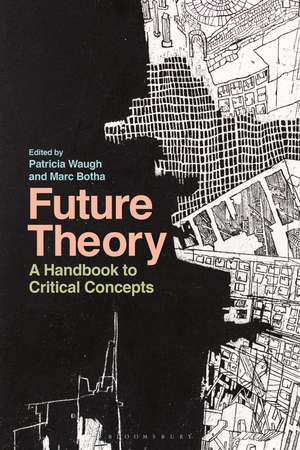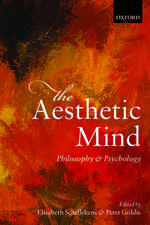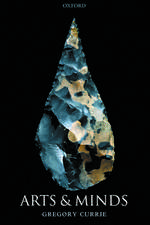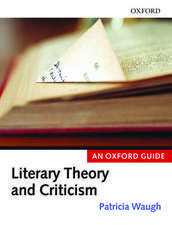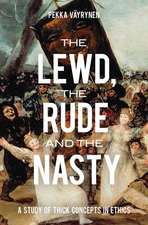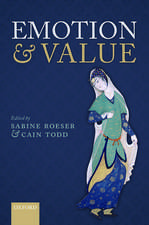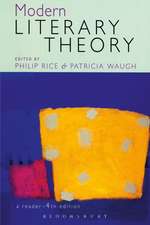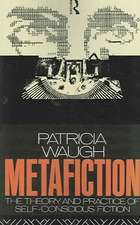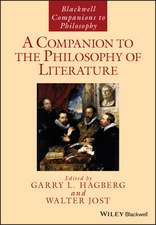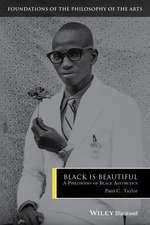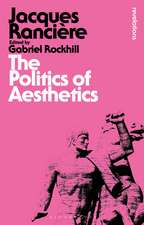Future Theory: A Handbook to Critical Concepts
Editat de Patricia Waugh, Marc Bothaen Limba Engleză Paperback – 19 apr 2023
| Toate formatele și edițiile | Preț | Express |
|---|---|---|
| Paperback (1) | 277.98 lei 43-57 zile | +95.97 lei 6-12 zile |
| Bloomsbury Publishing – 19 apr 2023 | 277.98 lei 43-57 zile | +95.97 lei 6-12 zile |
| Hardback (1) | 742.13 lei 22-36 zile | +42.30 lei 6-12 zile |
| Bloomsbury Publishing – 7 apr 2021 | 742.13 lei 22-36 zile | +42.30 lei 6-12 zile |
Preț: 277.98 lei
Preț vechi: 336.90 lei
-17% Nou
Puncte Express: 417
Preț estimativ în valută:
53.19€ • 55.68$ • 44.27£
53.19€ • 55.68$ • 44.27£
Carte tipărită la comandă
Livrare economică 31 martie-14 aprilie
Livrare express 22-28 februarie pentru 105.96 lei
Preluare comenzi: 021 569.72.76
Specificații
ISBN-13: 9781472567345
ISBN-10: 147256734X
Pagini: 480
Ilustrații: 5 mono images
Dimensiuni: 156 x 234 x 29 mm
Greutate: 0.72 kg
Editura: Bloomsbury Publishing
Colecția Bloomsbury Academic
Locul publicării:London, United Kingdom
ISBN-10: 147256734X
Pagini: 480
Ilustrații: 5 mono images
Dimensiuni: 156 x 234 x 29 mm
Greutate: 0.72 kg
Editura: Bloomsbury Publishing
Colecția Bloomsbury Academic
Locul publicării:London, United Kingdom
Caracteristici
A comprehensive and innovative re-evaluation of the continued importance of theory to contemporary thought
Notă biografică
Marc Botha is Lecturer in Modern and Contemporary Literature and Theory in the Department of English Studies at Durham University, UK. He is the author of Persistence and Transfiguration: A Theory of Minimalism (Bloomsbury, 2017).Patricia Waugh is Professor of English and Co-Director of the Institute of Hazard, Risk and Resilience at Durham University, UK.
Cuprins
AcknowledgementsINTRODUCTION Change: Patricia Waugh and Marc Botha (University of Durham, UK) PART ONE: THINKING THE CONDITIONS FOR CHANGE Climate: Timothy Clark (University of Durham, UK) Fragility: Marc Botha (University of Durham, UK) Memory: Enzo Traverso (Cornell University, USA) Remainder: Andrew Gibson (Royal Holloway, University of London, UK) Affect: Ankhi Mukherjee (Oxford University, UK) PART TWO: ORGANZING CHANGE Institution: Simon Critchley (The New School, USA) Movement: Esther Leslie (Birkbeck, University of London, UK) Community: Mick Smith (Queen's University, Canada) Continuity: Lev Manovich (The City University of New York, USA) Dissemination: Jon Adams (London School of Economics, UK) PART THREE: BOUNDARIES AND CROSSINGS Threshold: Matthew Calarco (California State University, Fullerton, USA) Periphery: Paulina Aroch Fugellie (Universidad Autonoma Metropolitana, Mexico)Exception: Justin Clemens (University of Melbourne, Australia) Migration: Mieke Bal (Amsterdam, The Netherlands)Privacy: Alexander Garcia Duttmann (University of the Arts, Berlin, Germany) PART FOUR: RUPTURE AND DISRUPTIONS Catastrophe: Jean-Michel Rabate (University of Pennsylvania, USA) Event: Mark Currie (Queen Mary University of London, UK) Revolution: Bruno Bosteels (Cornell University. USA) Fragmentation: Maebh Long (The University of the South Pacific, Fiji)Interference: Emily Apter (New York University, USA) PART FIVE: ASSEMBLAGES AND REALIGNMENTS Turns: Christopher Norris (Cardiff University, UK) Hybrid: Roger Luckhurst (Birkbeck, University of London, UK) Entanglement: Felicity Callard (University of Durham, UK) and Des Fitzgerald (King's College London, UK) Emergence: Patricia Waugh (University of Durham, UK)Network: Graham Harman ( SCI-Arc, Los Angeles, USA) PART SIX: CHANGING THE FUTURE Hospitality: Derek Attridge (University of York, UK)Fidelity: Creston Davis (Global Center for Advanced Studies, USA) and Alain BadiouResilience: Sarah Atkinson (University of Durham, UK)Trust: Alphonso Lingis (Penn State University, USA)Irreversibility: Claire Colebrook (Penn State University, USA)BibliographyIndex
Recenzii
Future Theory is not just a handbook explaining current critical concepts but a series of wide-ranging explorations, by an impressive international group of thinkers, of concepts that are likely to be critical for the future of theory, such as risk, catastrophe, climate, threshold, and, fortunately, hope.
